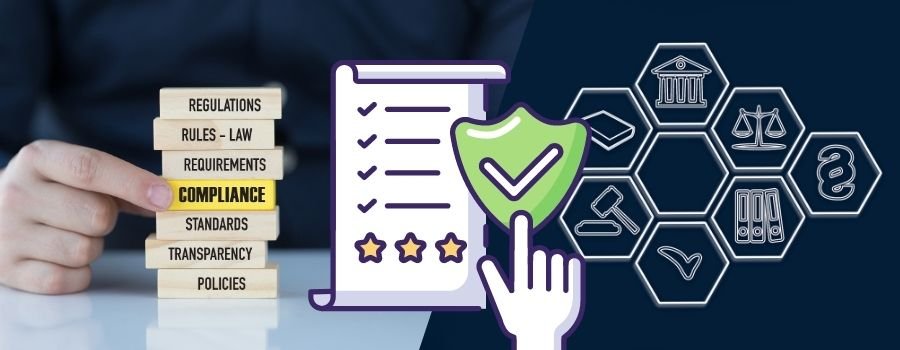Compliance management software supplies a centralized platform for compliance activities, including policy, risk assessment, audit, and incident management. This article discusses the importance of Order processing software, its application, benefits, and limitations.
What is Compliance Management Software
Compliance management software or governance, risk, and compliance (GRC) software helps organizations manage and monitor their compliance with legal and regulatory needs, industry standards, and internal policies and procedures.
GRC software typically includes a range of modules or features that allow organizations to assess and manage risks, track, and report on compliance activities, automate compliance processes, and manage internal controls. This software solution is often used by companies in highly controlled industries such as finance, healthcare, and energy, as well as those with complex supply chains or global operations.
Why is Compliance Management Software important?
Compliance management software provides a clear audit trail of compliance activities, making it easier for regulators, auditors, and customers to demonstrate compliance. Some important are given below:
Centralized Management of Compliance Activities
Compliance software delivers a centralized location for managing all compliance-related activities. It allows organizations to track compliance activities, monitor performance, and ensure that all relevant stakeholders are informed and involved. It is particularly useful for companies operating in multiple locations or with complex supply chains, as it can be difficult to ensure consistent compliance across all locations and partners.
Enhanced Risk Management
Compliance management software helps organizations identify and manage risks that could impact their compliance with legal and regulatory requirements. The software can provide risk assessments and alerts, allowing organizations to take corrective action before a risk becomes a larger issue. It can reduce non-compliance risk and protect the organization from legal and financial penalties.
Streamlined Compliance Processes
Compliance software can automate many compliance processes, decreasing the time and effort required to maintain compliance. For example, the software can automatically generate compliance reports and send alerts when a compliance activity is due. It reduces the burden on compliance teams and allows them to focus on more strategic activities.
Increased Efficiency and Cost Savings
Compliance management software can help organizations reduce compliance costs by streamlining processes and reducing non-compliance risk. It can save costs through reduced fines and penalties and improved operational efficiency. Additionally, the software can help organizations to avoid the cost of hiring additional compliance staff or external consultants to manage compliance activities.
Application of Compliance Management Software
Compliance management software, or governance, risk, and compliance (GRC) software, can be applied across different industries and organizations. Some applications are given below:
Regulatory Compliance Management
Organizations often use compliance software to manage compliance with legal and regulatory requirements. It can include tracking compliance with laws such as General Data Protection Regulation (GDPR), Health Insurance Portability and Accountability Act (HIPAA), Sarbanes-Oxley Act (SOX), and industry-specific regulations. The software can help organizations to monitor and track compliance activities, automate compliance processes, and provide reports for regulators and auditors.
Environmental, Social, and Governance (ESG) Compliance
Compliance management software can manage compliance with ESG requirements, such as environmental sustainability and social responsibility. The software can help organizations track and manage ESG risks, monitor compliance activities, and provide reports on ESG performance. It can help organizations to improve their ESG performance and show their commitment to sustainability and social responsibility.
Vendor Management
Compliance software can be used to manage vendor compliance, particularly in organizations with complex supply chains. The software can provide a centralized location for managing vendor compliance, tracking compliance activities, and ensuring that vendors meet regulatory requirements. It can help organizations to reduce the risk of non-compliance and improve transparency across the supply chain.
Policy Management
Compliance management software can manage internal policies and procedures, ensuring employees know and comply with these policies. The software can provide a centralized location for managing policies, tracking employee compliance, and automating policy management processes. It can help organizations to improve transparency, reduce the risk of non-compliance, and improve employee accountability.
Benefits of Compliance Management Software
Compliance management software (governance, risk, and compliance (GRC) software) can be applied in various industries and organizations to manage and monitor compliance activities. Some benefits are given below:
Financial Services
Compliance management software is widely used in financial services to manage regulatory compliance requirements. It can help organizations track and report on anti-money laundering (AML) activities, know your customer (KYC), and other regulatory requirements.
Healthcare
Healthcare organizations use compliance software to manage compliance with HIPAA, which governs the privacy and security of patient health information. The software can help organizations to manage policies, train employees, and track compliance activities.
Energy and Utilities
Compliance management software is used in the energy and utilities industry to manage compliance with environmental regulations, such as emissions and waste management. The software can help organizations to monitor compliance activities, track environmental risks, and report on sustainability performance.
Manufacturing
Manufacturing organizations use compliance management software to manage compliance with environmental, healthiness, and security (EHS) regulations. The software can help organizations track and manage hazardous materials, monitor emissions and waste, and ensure compliance with workplace safety regulations.
Limitation of Compliance Management Software
While compliance management software provides many benefits to organizations, it also has limitations. Some limitations are given below:
Limited Coverage
Compliance management software may only cover a limited range of compliance requirements, leaving some organizations to manage additional requirements manually. For example, some software may not cover industry-specific regulations, leaving organizations to manage compliance requirements independently.
Limited Integration
Compliance software may not integrate well with an organization’s other software systems, such as enterprise resource planning (ERP) or customer relationship management (CRM). It can lead to data duplication, errors, and increased complexity.
Overreliance on Technology
While compliance management software can automate many tasks and provide real-time monitoring, it cannot replace human judgment and decision-making. Overreliance on technology can lead to a false sense of security and may result in compliance failures or violations.
High Cost:
Compliance management software can be expensive to implement and maintain, especially for small and medium-sized organizations. The cost of licensing, customization, and ongoing support can be significant barriers to adoption. Organizations should carefully evaluate their needs and consider these limitations when selecting and implementing compliance management software.
Conclusion
Compliance management software (GRC software) is essential for organizations that must manage and monitor their compliance activities. Compliance management software is a powerful tool that can help organizations stay on top of their compliance obligations and reduce the risk of non-compliance. It is an effective investment that can pay off in the long run by improving compliance performance and reducing compliance-related costs and risks.



